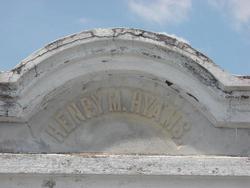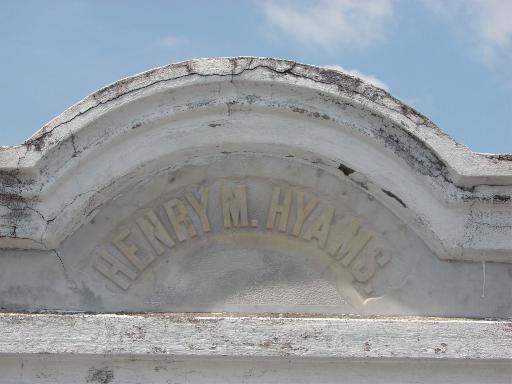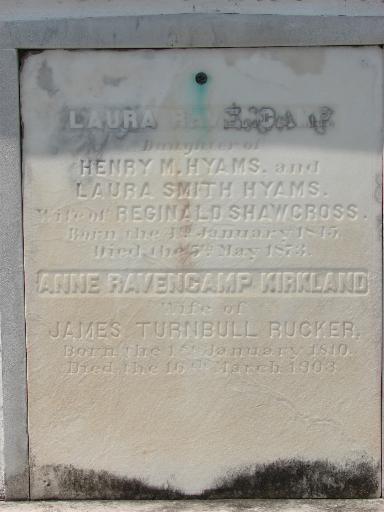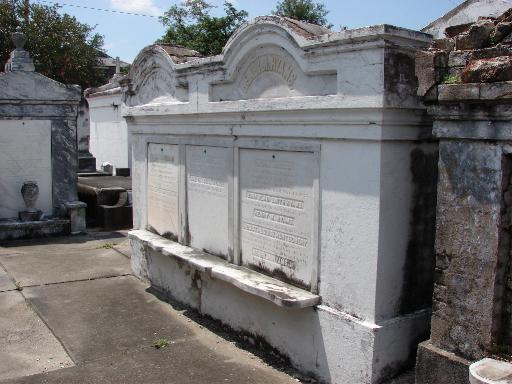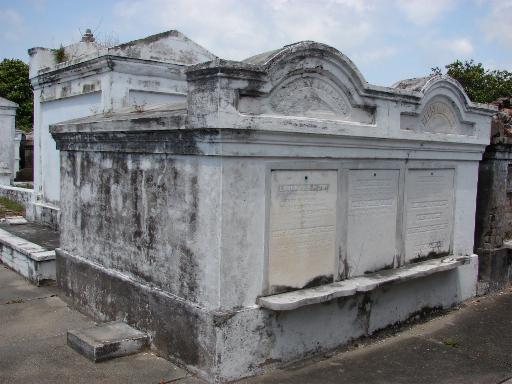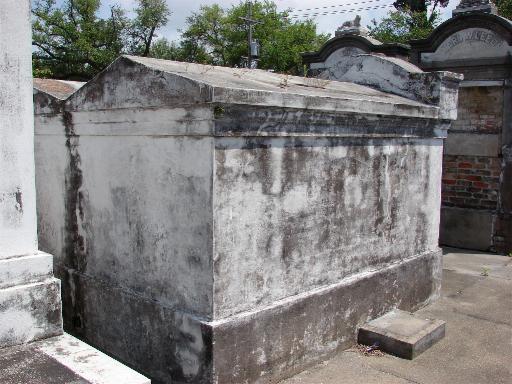THE LATE GOV. HYAMS
Hon. Henry Michael Hyams died yesterday (Friday) morning, at his house, 62 Royal street, at 1 o'clock, after a short but severe illness, in the seventieth year of his age.
He was born in Charleston, South Carolina, in 1805, where he was carefully and classically educated. In 1828 he came to Louisiana, and after diligent probationary study under the superintendence of Mr. Livermore, then a distinguished barrister, he was examined and admitted to the bar. Before engaging in the practice of the law, his talents as afinancier had attracted the attention of the Directors of the Canal Bank, and he was employed as the cashier and manager of the branch of that bank at Donaldsonville. He lived there until 1835, having in the year preceding married Laura Matilda, the accomplished and amiable daughter of Judge Smith, of West Feliciana, an eminent, wealthy and popular lawyer, and party leader. The union was in all respects most propitious; their affection and mutual esteem having strengthened and deepend continually for more than forty years. Her death, which occurred a few weeks ago, undoubtedly hastened that of her most devoted husband.
In 1835, Mr Hyams removed to Alexandria, in the parish of Rapides, and engaged in the practice of the law, in partnership with the late Judge William Dunbar, afterwards Representative in the United States Congress, and the late John K. Elgee, whose career and noble qualities are well remembered.
After fifteen years of very laborious and eminently successful practice, Mr. Hyams settled in New Orleans and made very extensive investments in city property, which with previous purchases of lands in all parts of the State, made him one of the largest owners of real estate in Louisiana. His purchases were made with exquisite judgement and managed with careful method. At the outbreak of the war his property was worth over a million of dollars.
In politics, Mr. Hyams had been from boyhood an opponent of the Democratic party, and before 1854 he was an active, energetic Old Line Whig and a very formidable one to the Democratic party. But when the American party arose to occupy the field in lieu of the Whigs, Mr. Hyams rejected their doctrine, refused to act and vote with them, and, in company with his intimate and very distinguished friend, Judah P. Benjamin, and other prominent Whigs, gave his adhesion to the Democratic party, his opposition to the Know Nothing party being marked with peculiar zeal and vehement energy.
From the date of his nominatoin to the State Senate in 1855 until the disastrous election of Abraham Lincoln, Gov. Hyams was eagerly and devotedly engaged in doing all that lay in his power to strengthen, solidify and enlarge the Democratic party. He worked rapidly, systematically and incessantly, leaving nostone unturned, repelling all attacks, refuting all calumnies, urging on the dilatory, encouraging the timid and infusing his own energy into writers, orators and managers. During a part of the memorable campaign of 1855 he accompanied the late Hon. E. Warren Moie, candidate for Attorney General on the Wickliffe ticket, through several parishes.
In the Senate, Mr. Hyams displayed legislative capacity of a very high order, giving promise of distinction in the higher sphere of legislation, to which he would have been sent, except for the war.
The confidence and esteem of his fellow citizens was again shown by his nomination as Lieutenant Governor, on the ticket with Governor Thomas Overton Moore in 1859. Another hard fought campaign resulted in a Democratic victory. As ecx-official President of the Senate, Gov. Hyams won new and well merited laurels. While the Senate was in session he seldom left the chair, insisting upon strict adhesion to rules and the observance of propriety and courtesy. He checked senators very promptly in their occasional proneness to wander out of the line of debate. He had that rare faculty of a presiding officer, of deciding and ruling promptly.
Gov. Hyams with his usual industry rendered all the assistance in his power to Gov. Moore and to his successor, Gov. Henry Watkins Allen, being seldom absent from headquarters, whether at Baton Rouge, New Orleans, Opelousas, Alexandria or Shreveport. He was especially earnest, zealous and active in aiding the philanthropic Allen in his noble efforts to relieve the distress of the impoverished people of Louisiana, Northeastern Texas and Southern Arkansas, employing such means and resources as the war had left to dim, with characteristic generosity.
Gov. Hyams and two sons resided a short time near Crockett, Houston county, Texas, where in a broad bend of the Trinity, his own and Gov. Moore's people cultivated successfully two adjacent plantations. Since the summer of 1865 he has lived in New Orleans.
The deceased was noted for temperance in habits, for great purity in character, for spotless integrity, for absolute fidelity to all engagements, for love of truth, and for constant devotion to duty. But his leading and ruling characteristic was that kindness of heart which made him a model as a husband, father, neighbor and friend. His charitable actions are innumerable, and very many mourn, in his death, the loss of a benefactor.
His leisure hours were given chiefly to books of science, history, poetry and fiction. He read much and rapidly, with a vigorous memory and lively attention. Though universally known throughout the State which he loved with a patriot's large heart, few knew the extent of his reading or his thorough appreciation of all the excellences of literature. He was well known as a thorough lawyer, a clear and forcible debater, an accomplished financier, and able legislator, and a political leader of uncommon magacity, but only his intimate friends knew the extent and scope of his acquaintance with ancient and modern writings, or knew how much he was charmed with the beauties and gems of literature. He was one of the most amiable of men, cheerful, vivacious and companionable.
In hours of ease his conversation was literally charming. His allusion to favorite authors, and his quotations made from memory, mingled with witticlams and pungent comments, spiced all his conversation.3
Our pure, public-spirited, generous and noble friend was a devotee to truth in fact, and truth in principle, having no concealments and being a thorough admirer of all true men. Always a faithful friend, he was most friendly to those whom he found to be like himself - candid, generous and true. In temper he was often impetuous and sometimes even irascigle; but in the very tempest of indignation he never forgot courtesy or justice. He possessed great moral courage, and, being quick in thought as well as utterly candid, he never hesitated a moment in announcing his convictions. While others halted, he dashed forward, took his position boldly, and then maintained it with uncommon skill and vigor.
Gov. Hyams was by race and faith a Hebrew, a Jew in whom there was no guile, altogether in earnest in his religious convictions as he was in the practice of his duties to his Creator and his fellowmen. He had no bigotry and respected the faith of others, but was himself profoundly reverential and pious.
The New Orleans Bulletin
New Orleans, Louisiana
Saturday, June 26, 1875
Vol: 2 Page: 5
THE LATE GOV. HYAMS
Hon. Henry Michael Hyams died yesterday (Friday) morning, at his house, 62 Royal street, at 1 o'clock, after a short but severe illness, in the seventieth year of his age.
He was born in Charleston, South Carolina, in 1805, where he was carefully and classically educated. In 1828 he came to Louisiana, and after diligent probationary study under the superintendence of Mr. Livermore, then a distinguished barrister, he was examined and admitted to the bar. Before engaging in the practice of the law, his talents as afinancier had attracted the attention of the Directors of the Canal Bank, and he was employed as the cashier and manager of the branch of that bank at Donaldsonville. He lived there until 1835, having in the year preceding married Laura Matilda, the accomplished and amiable daughter of Judge Smith, of West Feliciana, an eminent, wealthy and popular lawyer, and party leader. The union was in all respects most propitious; their affection and mutual esteem having strengthened and deepend continually for more than forty years. Her death, which occurred a few weeks ago, undoubtedly hastened that of her most devoted husband.
In 1835, Mr Hyams removed to Alexandria, in the parish of Rapides, and engaged in the practice of the law, in partnership with the late Judge William Dunbar, afterwards Representative in the United States Congress, and the late John K. Elgee, whose career and noble qualities are well remembered.
After fifteen years of very laborious and eminently successful practice, Mr. Hyams settled in New Orleans and made very extensive investments in city property, which with previous purchases of lands in all parts of the State, made him one of the largest owners of real estate in Louisiana. His purchases were made with exquisite judgement and managed with careful method. At the outbreak of the war his property was worth over a million of dollars.
In politics, Mr. Hyams had been from boyhood an opponent of the Democratic party, and before 1854 he was an active, energetic Old Line Whig and a very formidable one to the Democratic party. But when the American party arose to occupy the field in lieu of the Whigs, Mr. Hyams rejected their doctrine, refused to act and vote with them, and, in company with his intimate and very distinguished friend, Judah P. Benjamin, and other prominent Whigs, gave his adhesion to the Democratic party, his opposition to the Know Nothing party being marked with peculiar zeal and vehement energy.
From the date of his nominatoin to the State Senate in 1855 until the disastrous election of Abraham Lincoln, Gov. Hyams was eagerly and devotedly engaged in doing all that lay in his power to strengthen, solidify and enlarge the Democratic party. He worked rapidly, systematically and incessantly, leaving nostone unturned, repelling all attacks, refuting all calumnies, urging on the dilatory, encouraging the timid and infusing his own energy into writers, orators and managers. During a part of the memorable campaign of 1855 he accompanied the late Hon. E. Warren Moie, candidate for Attorney General on the Wickliffe ticket, through several parishes.
In the Senate, Mr. Hyams displayed legislative capacity of a very high order, giving promise of distinction in the higher sphere of legislation, to which he would have been sent, except for the war.
The confidence and esteem of his fellow citizens was again shown by his nomination as Lieutenant Governor, on the ticket with Governor Thomas Overton Moore in 1859. Another hard fought campaign resulted in a Democratic victory. As ecx-official President of the Senate, Gov. Hyams won new and well merited laurels. While the Senate was in session he seldom left the chair, insisting upon strict adhesion to rules and the observance of propriety and courtesy. He checked senators very promptly in their occasional proneness to wander out of the line of debate. He had that rare faculty of a presiding officer, of deciding and ruling promptly.
Gov. Hyams with his usual industry rendered all the assistance in his power to Gov. Moore and to his successor, Gov. Henry Watkins Allen, being seldom absent from headquarters, whether at Baton Rouge, New Orleans, Opelousas, Alexandria or Shreveport. He was especially earnest, zealous and active in aiding the philanthropic Allen in his noble efforts to relieve the distress of the impoverished people of Louisiana, Northeastern Texas and Southern Arkansas, employing such means and resources as the war had left to dim, with characteristic generosity.
Gov. Hyams and two sons resided a short time near Crockett, Houston county, Texas, where in a broad bend of the Trinity, his own and Gov. Moore's people cultivated successfully two adjacent plantations. Since the summer of 1865 he has lived in New Orleans.
The deceased was noted for temperance in habits, for great purity in character, for spotless integrity, for absolute fidelity to all engagements, for love of truth, and for constant devotion to duty. But his leading and ruling characteristic was that kindness of heart which made him a model as a husband, father, neighbor and friend. His charitable actions are innumerable, and very many mourn, in his death, the loss of a benefactor.
His leisure hours were given chiefly to books of science, history, poetry and fiction. He read much and rapidly, with a vigorous memory and lively attention. Though universally known throughout the State which he loved with a patriot's large heart, few knew the extent of his reading or his thorough appreciation of all the excellences of literature. He was well known as a thorough lawyer, a clear and forcible debater, an accomplished financier, and able legislator, and a political leader of uncommon magacity, but only his intimate friends knew the extent and scope of his acquaintance with ancient and modern writings, or knew how much he was charmed with the beauties and gems of literature. He was one of the most amiable of men, cheerful, vivacious and companionable.
In hours of ease his conversation was literally charming. His allusion to favorite authors, and his quotations made from memory, mingled with witticlams and pungent comments, spiced all his conversation.3
Our pure, public-spirited, generous and noble friend was a devotee to truth in fact, and truth in principle, having no concealments and being a thorough admirer of all true men. Always a faithful friend, he was most friendly to those whom he found to be like himself - candid, generous and true. In temper he was often impetuous and sometimes even irascigle; but in the very tempest of indignation he never forgot courtesy or justice. He possessed great moral courage, and, being quick in thought as well as utterly candid, he never hesitated a moment in announcing his convictions. While others halted, he dashed forward, took his position boldly, and then maintained it with uncommon skill and vigor.
Gov. Hyams was by race and faith a Hebrew, a Jew in whom there was no guile, altogether in earnest in his religious convictions as he was in the practice of his duties to his Creator and his fellowmen. He had no bigotry and respected the faith of others, but was himself profoundly reverential and pious.
The New Orleans Bulletin
New Orleans, Louisiana
Saturday, June 26, 1875
Vol: 2 Page: 5
Bio by: Nahm
Family Members
-
![]()
Miriam Ravencamp Hyams
1835–1844
-
Isaac Smith Hyams
1837–1883
-
![]()
Kosciusko Ravencamp Hyams
1839–1874
-
![]()
Samuel Eleazar Hyams
1841–1842
-
![]()
Judith Anne Hyams Sprigg
1842–1867
-
![]()
Laura Ravencamp Hyams Shawcross
1845–1873
-
![]()
Henry Michael Hyams Jr.
1846–1887
-
![]()
John Blair Smith Hyams
1850–1875
-
George Hyams
1850 – unknown
-
Judah Benjamin Hyams
1851–1855
-
Albert Hyams
1854 – unknown
-
Richard King Hyams
1854 – unknown
-
Ingraham Hyams
1857 – unknown
-
Mary Hyams
1858 – unknown
Advertisement
Advertisement
